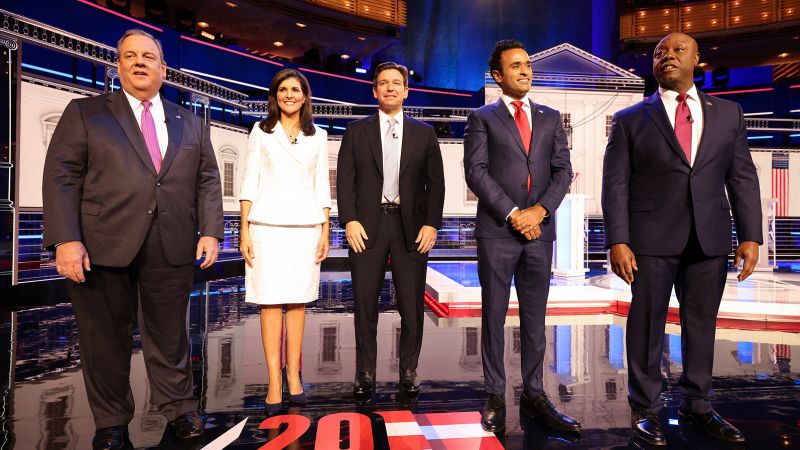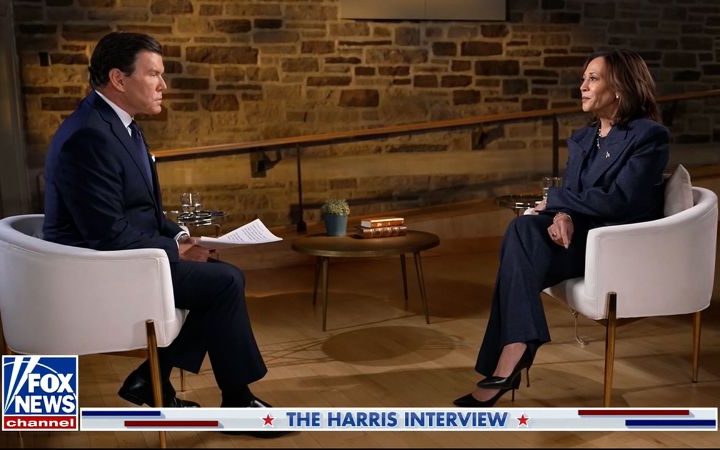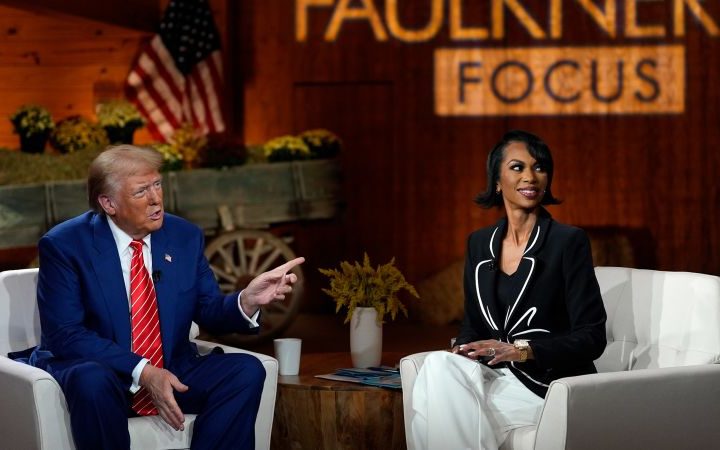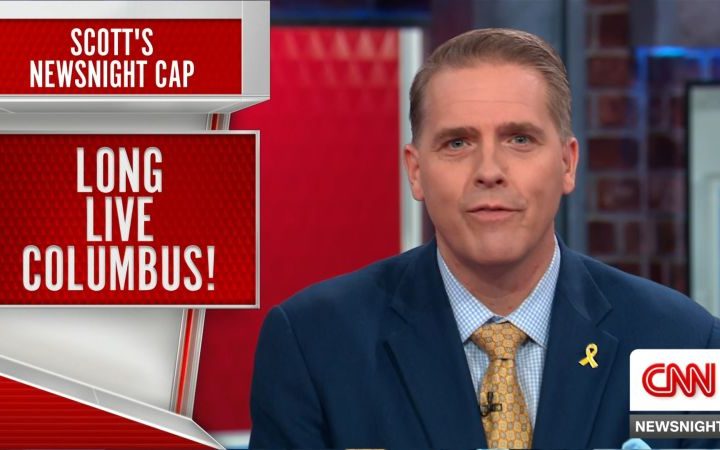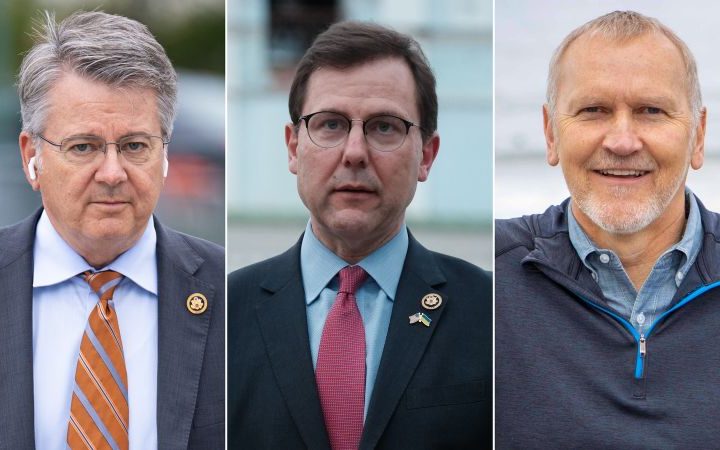Republicans admit abortion rights are a huge challenge for them in 2024 but judging by their presidential debate Wednesday, they’re nowhere near defusing an issue that has cost them votes ever since Roe v. Wade was overturned last year.
A day after Democrats leveraged reproductive rights to rack up big election wins in Virginia, Ohio and Kentucky, Republican hopefuls attempted an impossible balancing act. They sought to satisfy anti-abortion rights base voters for whom the movement to overturn Roe was an article of faith. But they also tried to avoid alienating suburban moderates and female voters critical to deciding the destiny of the White House and Congress next year.
The five candidates on stage for NBC’s debate in Miami came up with at least five different positions about the extent to which abortion should be allowed and over whether the federal government or the states should adjudicate the issue. The mess of approaches underscored how Republicans – who for years used the stark clarity of the anti-abortion drive to galvanize their voters – now lack a single compelling position to combat political messaging from Democrats and pro-abortion rights groups.
Candidates struggle for coherence on a critical issue
Former South Carolina Gov. Nikki Haley, who has warned long before Wednesday that the GOP is failing to communicate on abortion outside their base, said that although she is strongly against the procedure, Republicans have to recognize there is no majority in the Senate for passing a national ban. “No Republican president can ban abortions,” Haley said, repeating a consistent position perhaps designed to avoid angering women and independent voters in a broader general electorate. “As much as I am pro-life, I don’t judge anyone for being pro-choice,” Haley said. She called for a search for “consensus” on the issue though didn’t say how it might be reached.
Haley’s main rival to be the alternative to former President Donald Trump in the GOP race, Florida Gov. Ron DeSantis, signed his state’s six-week abortion ban earlier this year. If he made it to the general election, the move could drive away moderate voters. Apparently seeking to ease such vulnerabilities, he recognized that some states might take a different position than Florida. He also suggested conservatives start winning ballot initiatives, which is easier said than done. “You have got to do a better job on these referenda. I think of all the stuff that’s happened on the pro-life cause, they’ve been caught flat-footed on these referenda and they’ve been losing the referenda.”
South Carolina Sen. Tim Scott said that as president he would “have” a 15-week national abortion ban, though gave no details on how he’d get it passed in Congress. Biotech executive Vivek Ramaswamy, meanwhile, said it was time for a “new generation” to lead the country to a better place on abortion, though aside from advocating more success in ballot measures, he failed to say how he would get there. Former New Jersey Gov. Chris Christie argued that since the Supreme Court’s Dobbs decision last year was rooted in returning the issue to the states, that’s where it should be decided. “I trust the people of this country, state-by-state, to make the call for themselves,” Christie said.
The Republican candidate who could be most exposed by the abortion issue was not on stage. Trump, the GOP’s runaway front-runner, is boycotting the debates since he sees no political advantage in sparring with his distant challengers. Trump steered clear of the issue, beyond generally touting the conservative Supreme Court majority, at his Florida rally Wednesday evening.
While Trump’s abortion position is less hardline than some of his GOP rivals, he’s insulated politically in the primary since he built that Supreme Court majority that accomplished a generational goal of anti-abortion campaigners.
But the former president’s heavy-handed efforts to parse the abortion issue recently show he understands the danger abortion politics could pose in a general election.
Trump is simultaneously seeking to claim credit for the court throwing out Roe v. Wade after half a century and to avoid any backlash from that judicial earthquake. He said in an interview with NBC’s “Meet the Press” in September, “I did something that nobody thought was possible and Roe v. Wade was terminated and put back to the states.”
But Trump repeatedly prevaricated when asked whether he would sign any law that, for instance, banned abortion after 15 weeks – a similar cut-off to one with exceptions backed by Virginia Gov. Glenn Youngkin in a proposal with exceptions that was effectively rejected when Democrats held control of the state Senate and flipped the House on Tuesday.
The ex-president’s answers degenerated into incoherence when he was put on the spot. “What’s going to happen is you’re going to come up with a number of weeks or months. You’re going to come up with a number that’s going to make people happy,” he told NBC. Betraying his lack of a plan on the issue and an absence of deep thinking, Trump added: “Something will happen with the number of weeks, the amount of time, after which you can’t do it. … You will win on this issue when you come up with the right number of weeks.”
Amazingly, after such waffling, Trump complained: “I think the Republicans speak very inarticulately about this subject.”
As well as their wins in Virginia, Democrats and abortion rights campaigners were celebrating after voters in Ohio, now a reliable red state in presidential elections, approved an amendment to the state constitution enshrining the right to an abortion. And in deeply conservative Kentucky, Democratic Gov. Andy Beshear secured a second term after a campaign in which he slammed his opponent, Republican Daniel Cameron, for opposing exceptions to the state’s abortion ban.
Top Democratic leaders rushed to capitalize on Tuesday’s victories and create momentum for Biden, after a rough set of polls, by putting abortion rights at the center of the 2024 campaign.
Vice President Kamala Harris initiated a rare media opportunity with reporters outside the West Wing. Abortion seems likely to be one of her signature issues on the campaign trail. “ Voters said, ‘Look, the government should not be telling a woman what to do with her body,’” Harris said. “I think voters have been clear, regardless of whether they’re in a so-called red or blue state, that one does not have to abandon their faith or deeply held beliefs to agree that government should not be telling a woman what to do with her body.”
Biden’s campaign issued a statement, slamming Trump for his part in overturning Roe v. Wade and associating him with abortion bans adopted by deeply conservative states.
“Voters deserve to hear Donald Trump’s own words,” said Biden campaign spokesperson Ammar Moussa. “As he’s said many times, no one did more to pave the way for abortion bans than Trump, and he was proud and honored to do it. Republicans across the country are tied to Trump’s losing MAGA agenda of ripping away Americans’ fundamental freedoms and voters will hold Donald Trump and his MAGA buddies accountable next November.”
Democrats countrywide are already targeting GOP candidates lower down the ballot. The Montana Democratic Party, for instance, criticized Tim Sheehy, a Republican running to unseat Democratic Sen. Jon Tester, and GOP Rep. Matt Rosendale, who is also considering a bid, warning that their anti-abortion rights positions will “haunt them on the campaign trail.” The campaign of Ohio Democratic Sen. Sherrod Brown – another vulnerable senator next year – released a video highlighting his GOP opponents’ anti-abortion rights positions.
As they digested a second straight year of downbeat election results, some top Republicans admitted Wednesday that they need a more nuanced take on abortion. With Democrats seeking to add abortion measures to the ballot in swing states next year, the GOP is starting to look for ways to combat Democratic victories – or at least to try to find a way to win on such referenda. “You have to accept that we have some real public opinion and persuasion work to do,” Ohio GOP Sen. JD Vance told CNN. “If you can’t admit that, I don’t think you’re being serious about the issue.” Unlike many Republicans, who want to avoid taking hard positions on an issue the Supreme Court allowed them to leave to the states, Vance called for a national GOP position. He is advocating a new law imposing a 15-week ban on abortion with exceptions.
South Dakota Sen. John Thune, a member of the GOP leadership, meanwhile predicted Democrats will make abortion central to 2024 and that the GOP needs to be ready. “For sure it’s going to be an issue. Democrats are going to insist that it is. And I think Republican candidates are going to have to have an answer and explanation for why they believe what they do,” Thune said.
Utah Sen. Mitt Romney told CNN’s Manu Raju that Republican candidates should focus more closely on issues like the cost of living. “When we’re talking about some social issues, they can become highly divisive and we end up not doing as well as we could have,” said the senator, who’s not seeking reelection.
Polls have repeatedly shown that candidates are looking closely at candidates and their positions on abortion. In a CNN/SSRS poll conducted in August, for instance, 64% of US adults said they disapproved of last year’s Supreme Court decision that women don’t have a constitutional right to abortion. Just 16% of people polled didn’t see abortion as a major issue, a record low in CNN polling dating back to 1996.
Those eagle-eyed voters are not seeing much yet from Republicans that suggests they will force Democrats to cede the advantage on the issue next year.
Read the full article here
